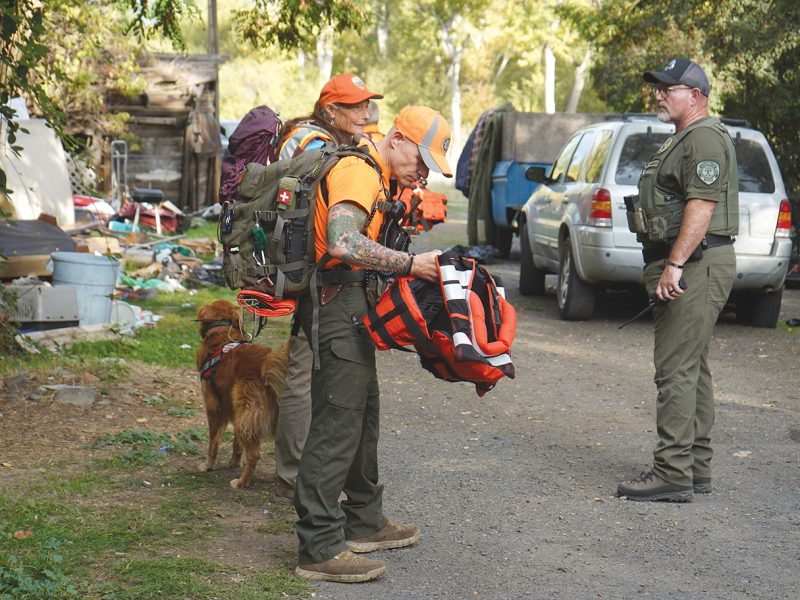By Wil Phinney of the CUJ
MISSION – More than 30 years after the first official resolution cited the need, a pair of “Sober Transition” homes could open as early as August for a dozen adults on the Umatilla Indian Reservation. The Confederated Tribes’ Health Commission, working with Yellowhawk Tribal Health Center and its Alcohol & Drug Program, put together the Sober Transition Housing Project over the last year.
Yellowhawk will develop two 2,000 plus square foot homes, one for men and another for women who are returning after spending time at a detoxification or in-patient treatment facility for a diagnosed substance-use disorder or have been diagnosed with a substance-use disorder with a risk of relapse.
“This won’t be a silver bullet, but for 12 people for one year it will be a safe place to get established back in the Tribal community,” said Shayne Arndt, Alocohol and Drug Clinical Manager at Yellowhawk, who is heading up the effort.
There is plenty of anecdotal evidence that indicates the need for transitional housing. Recovering addicts are quick to acknowledge that returning to the reservation from treatment facilities is difficult because they come back to the same situations and circumstances that put them at risk in the first place. But Nancy Kirksey, Behavioral Health Administrative Assistant, said research also quantifies the demand.
The Community Impact of Substance Abuse report of 2010, completed by the Northwest Portland Area Indian Health Board in collaboration with the Confederated Tribes, showed 46 percent of all arrests by Umatilla Tribal Police involved alcohol and drugs. The same report indicated 60 percent of all referrals to the CTUIR Department of Children and Family Services involved alcohol and drugs.
Arndt said data for the Umatilla Indian Reservation shows a large number of people struggle with alcohol abuse, but they also are dealing with methamphetamine or opioid abuse. To a lesser extent, and usually in combination with the other three substances, people on the reservation use marijuana, which is legalized in Oregon but remains illegal by Tribal statute.Nationally, Kirksey said, the relapse after in-patient treatment is about 75 percent because of barriers when individuals return to the same environment from which they left.
Plans call for a grand opening later this summer; however with the COVID-19 situation that time could change, Kirksey said.
A CTUIR Board of Trustees resolution in 1989 first recognized the need for a drug-and-alcohol transition house. The last facility, the Transition Living Center (also known as the log cabin in Tutuilla Flats) closed in 2000 after a client violated rules. The co-ed facility was operated as a component of Yellowhawk’s Tribal Chemical Dependency Program. An analysis of the program suggested it be changed to males only with a stay limited to two months and a focus on finding housing and employment. It was not staffed all day and all night.
In 2008, an independent assessment by the Native American Rehabilitation Association of the Northwest (NARA) determined the Transition Living Center was not suitable as a residence for adults returning to the reservation after receiving drug- or alcohol-abuse treatment. Among the reasons cited was the isolation of the facility, which made it difficult to monitor and manage, and created problems for clients to interact in the community and get to additional treatment available at Yellowhawk in Mission. The log cabin has been used since then as a residence, but the demand for a transition home has not diminished.
In 2015 an Alcohol and Drug Task Force again made a recommendation for a transition house and this year Yellowhawk’s annual work plan included such a facility.
The new units, which will be adjacent to one another but separated by a courtyard, will be located on B Street in the BIA compound. Yellowhawk will turn the old CTUIR Fisheries building into the house for men. It will be like a “typical home,” Kirksey said, with two bathrooms, a kitchen, and a living room with the normal furnishings like television. A new modular unit that will be moved in for the women will be much the same, but it will include three bathrooms.
The facilities will be supported 24-hours-a-day seven-days-a-week by peer-recovery mentors, and will have space for a supervisor and licensed counselor, Arndt said.
The sober transitional housing will serve all persons eligible for services at Yellowhawk who are 18 years of age and older and meet the criteria of “diagnosed substance-use disorder” and are pursuing recovery, Arndt said.
Arndt gave an example of someone who completes treatment at NARA and wants to return to the Umatilla Indian Reservation.
“Historically they have not had a safe place because of the risk of returning to the same people, places and things,” Arndt said. “We hope to offer a safe place with their peers, culturally grounded in the services we provide with a focus on recovery where individuals can return to school or develop job skills to get into the work force. As they develop sobriety on the reservation, they become more self-sufficient.”
Arndt said it will be important that beyond treatment, Yellowhawk is able to partner with Alcoholics Anonymous and Narcotics Anonymous chapters that function on the Umatilla Indian Reservation.
Men and women maintaining sobriety may stay in the Sober Transitional Housing for up to a year. They would be able to leave “when they are ready” in “consultation with a counselor.”
During fiscal year 2018-19, the CTUIR Tribal Health Commission, in coordination with Yellowhawk Chief Executive Officer Lisa Guzman, recognized the need for the Sober Transitional Housing. Guzman, in coordination with Arndt, identified and earmarked grant funds for development of the Sober Transitional Housing.
A business plan was developed by Yellowhawk administrators. The project was approved by the Tribes’ Capital Improvements Committee in March and the BIA gave its blessing provided the agency is held harmless for the facilities and operations. Following a work session April 7, the BOT gave its support and authorized Yellowhawk to apply for permits and proceed with the project April 13.
Tribal government approved the use of $75,000 toward the project using the 2020 Wellbriety Budget, which is funded by money earned from sales of alcohol at Wildhorse Resort & Casino. The other grant money is from state and federal opioid-response funding secured through the Northwest Portland Area Indian Health Board.
Arndt, who wrote the proposal requests, said Kirksey has been “invaluable” in implementing Yellowhawk’s transitional housing plan.



